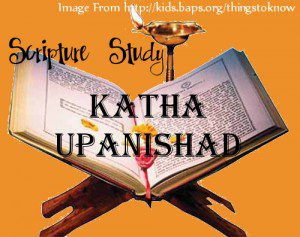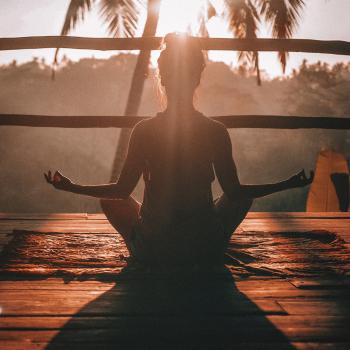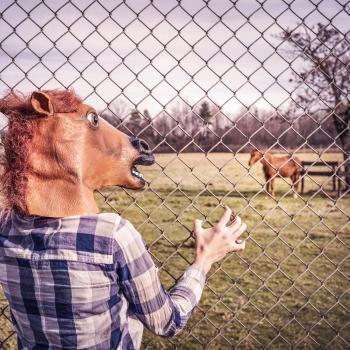We are doing a scripture study together: reading along through some scriptures and discussing the passages. Today is the fifth post of my favorite Upanishad: The Katha. This is the story of a boy who chatted with the God of death.
Chapter III http://www.angelfire.com/electronic/awakening101/upani_katha.html
1
Two there are who dwell within the body, in the intellect, the supreme akasa of the heart, enjoying the sure rewards of their own actions. The knowers of Brahman describe them as light and shade, as do those householders who have offered oblations in the Five Fires and also those who have thrice performed the Nachiketa sacrifice.
2
We know how to perform the Nachiketa sacrifice, which is the bridge for sacrificers; and we know also that supreme, imperishable Brahman, which is sought by those who wish to cross over to the shore where there is no fear.
3
Know the atman to be the master of the chariot; the body, chariot; the intellect, the charioteer; and the mind, the reins.
4
The senses, they say, are the horses; the objects, the roads. The wise call the atman—united with the body, the senses and the mind—the enjoyer.
5
If the buddhi, being related to a mind that is always distracted, loses its discriminations, then the senses become uncontrolled, like the vicious horses of a charioteer.
6
But if the buddhi, being related to a mind that is always restrained, possesses discrimination, then the senses come under control, like the good horses of a charioteer.
7
If the buddhi, being related to a distracted mind, loses its discrimination and therefore always remains impure, then the embodied soul never attains the goal, but enters into the round of births.
8
But if the buddhi, being related to a mind that is restrained, possesses discrimination and therefore always remains pure, then the embodied soul attains that goal from which he is not born again.
9
A man who has discrimination for his charioteer and holds the reins of the mind firmly, reaches the end of the road; and that is the supreme position of Vishnu.
Chapter-III http://www.vedarahasya.net/katha-3.htm
“In order to reap the results of one’s own actions done in this world, two (people or Jivas) are said to be entering the cave of heart and residing there (until such results are reaped fully). The wise men, the worshippers of the five-fold aspect of agni (fire-god) and those who have completed the Naciketa-agni worship atleast thrice – compare these two to light and shadow (the actual comparable simile is that of Jivatma and the Paramatma).”
“I think this practice of Naciketa-Agni shall serve like a bridge (unto the Supreme) for those who perform Yagnas or sacrifices, and like the immortal Brahman and shall be the place of no fear for those who want to cross the ocean of births and deaths.”
“If the body be the chariot, the mind (or the manas) is the steering cord (of the horse), the intellect is the driver and the traveler is the Jiva or the Purusa. Understand it to be so.”
“The horses (driving the above chariot) are the sense organs and the materialistic desires or things of interest are the paths it travels by. The wise ones call the Jiva, which comprises of the body, the mind and the sense organs as ‘Bhoktha’.”
“In as much the same way that the wild horses cannot be tamed by a rider, the sense organs will be uncontrollable by that one who has no control over his mind and has no sense of intellect.”
“(On the other hand), the sense organs will be fully under the control of that one who has complete control over his mind and has the distinguishing power of intellect. This is comparable to the control a rider exercises over trained, tamed, good horses.”
“That one who has no intellect, who has no control over his mind and who is dirty (in his mind and thoughts), he will not reach the destination (of the Supreme). He will continue to wander in this world through further births.”
“(On the other hand), that one who is full of intelligence and who has complete control over his mind and is very clean (in his mind and thoughts), he reaches that place from where nothing is ever born again. (the destination of the Supreme).”
“That one who has the intelligence as the rider and a controlled mind as the steering cord, he travels the long way and ultimately reaches the end of the tedious path of samsaara (or the materialistic world). That is the state (called as the Parama-pada) where there is a unison between the Jiva and the all-pervading Divinity.”
“Beyond the sense organs are the objects of sense. Beyond them is the mind. Beyond it is the brain or intuition. Beyond that is the great soul (one of the aspects of the Atma).”
“Beyond that great soul is the unmanifest divine. Beyond that is the Purusha (the all knowing and all pervading Atma). There is nothing beyond the Purusha. That is the end. That is the supreme.”
Commentary (Swami Krishnananda)
Rapid motion causes the object to look static. The world is an illusion because it is different from what it appears to be. It is a reflection and has no substantiality. It is this contrast between the original and the reflection that is brought out in this verse.
…The two are the divine and human element in us. Our animal part is not considered here. It is taken for granted that we have risen above it. Human nature often gets contaminated by sub-human instincts. Our passions, whatever they be—intellectual, mental, sensual—are not human, but animalistic, and blur the human nature. The divine element comes into play occasionally, in times of inspiration. In its lowest form, it is conscience. In its higher one, it is spiritual; and in the highest it is the Atman. But the senses speak loudly, and so the voice of conscience gets drowned.
…“The senses are the horses, the objects are the roads along which the chariot is driven; the self, associated with the body, the senses and the mind—the wise say—is the enjoyer.”
This gives us an idea how our senses are connected to objects of the world. The purpose of the chariot’s movement is to reach the destination for its rider. But the chariot is only a help, and the driver must be intelligent and know the course. The Atman, in combination with the body, the indriyas and manas, is a karta, doer, andbhokta, enjoyer. Minus the intellect, we are karta and bhokta.
…There should not be any kind of discord between the two. The reigns should not break; the chariot should not crash. The Atman is essential, the body is essential; the senses are essential as motive power; but only blended with the intellect they make a beautiful combination… And just as a person will not reach his destination if a horse is not good, a seeker whose intellect is clouded cannot control the senses and does not move along the right path.
…The objects are many, though the elements which constitute them are only five. There is a tremendous excitement of the senses when they behold the colourful world of objects. We begin to see through them rather than the intellect, and since they are diversified, we are presented a diversified world of which we do not know what to choose. Thus, without intelligence, there is restless activity.
…The last quarter of mantra nine is borrowed from the Rig Veda. It says that the state of Vishnu is beheld by the wise ones as the state of all-pervading ether. The place of Vishnu is not a location or palace. It is spread out like ether or space, like the ocean. The river is everywhere when it reaches the ocean and does not remain localised in one place. Likewise is the soul when it reaches vishnupada. The Universal Being is Vishnu. The moment a jiva reaches his destination, he enters vishnupada. Therefore the body is to be utilised as a vehicle of action in the movement of the soul to God.
There is nothing wrong with our senses, mind, etc., but they should be directed properly. Evil is that which is misdirected. A thing is not evil in itself, but when it performs another’s function it is evil, just as anything out of place is dirt. So everything should be in its proper place and yoked properly. The world is a training-ground in which the objects and senses are occasions for mastering our energies so that they get unified through the senses, mind and intellect. We look weak because all our energies leak out through the senses. If you conserve your health and concentrate your effort in a single channel, it is called dharana. This will make you powerful; this is yoga. By the control of the senses, the mind and the intellect, the soul becomes fit for God-realisation.
My Thoughts
This image of the chariot is a beautiful and powerful one. It really clarifies how the restless mind needs to be tamed to direct us towards the goal.
Buddhi/intelligence is the intellect. It is the reasoning mind which can discriminate between things, emotions, feelings, objects, etc.
We might not be used to thinking of our beings as several separate moving parts. In Hindu tradition this is very common. There is the buddhi part of the mind and there is the part that delights in sense objects and the part that is the steady atman, etc.















